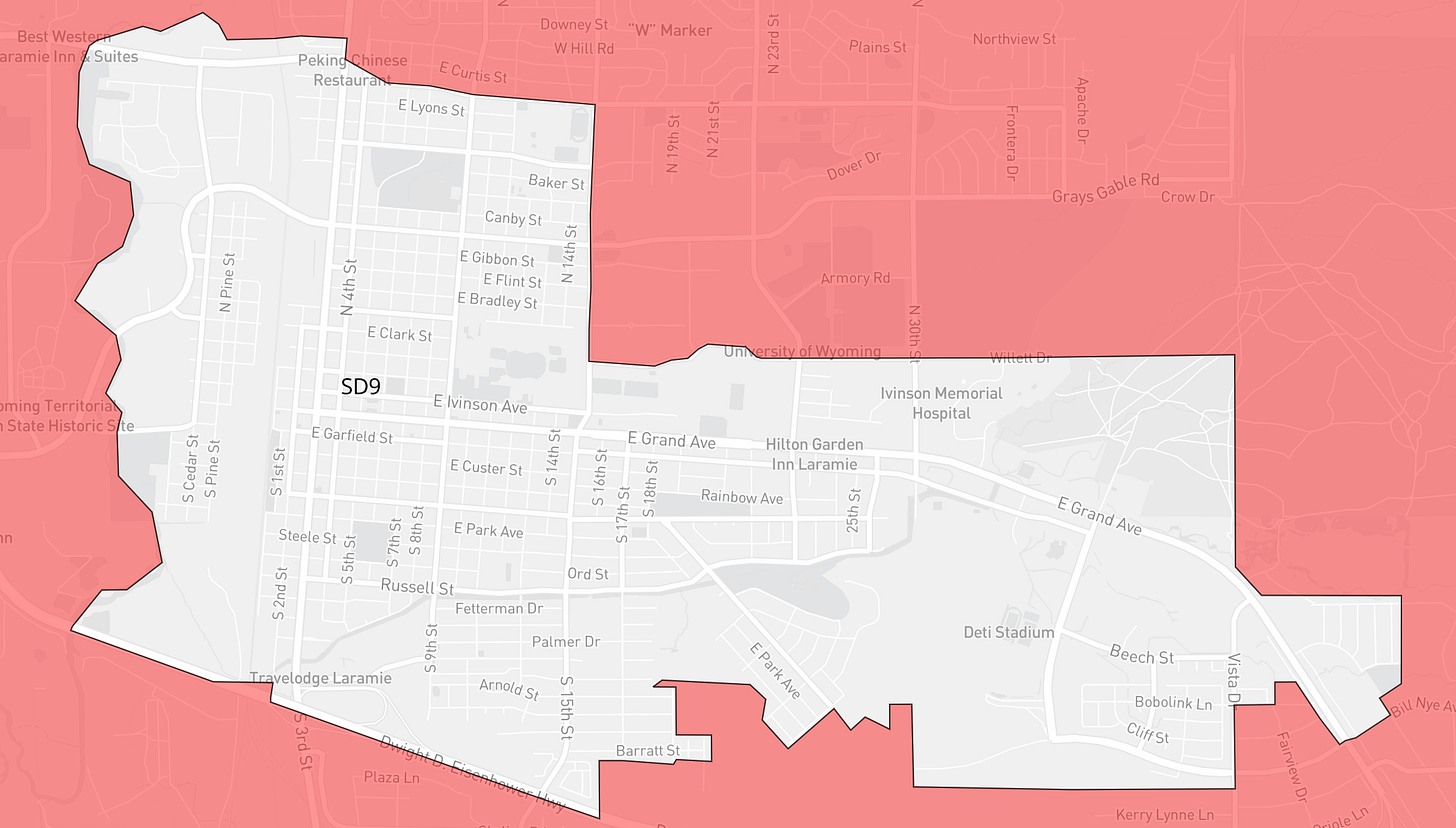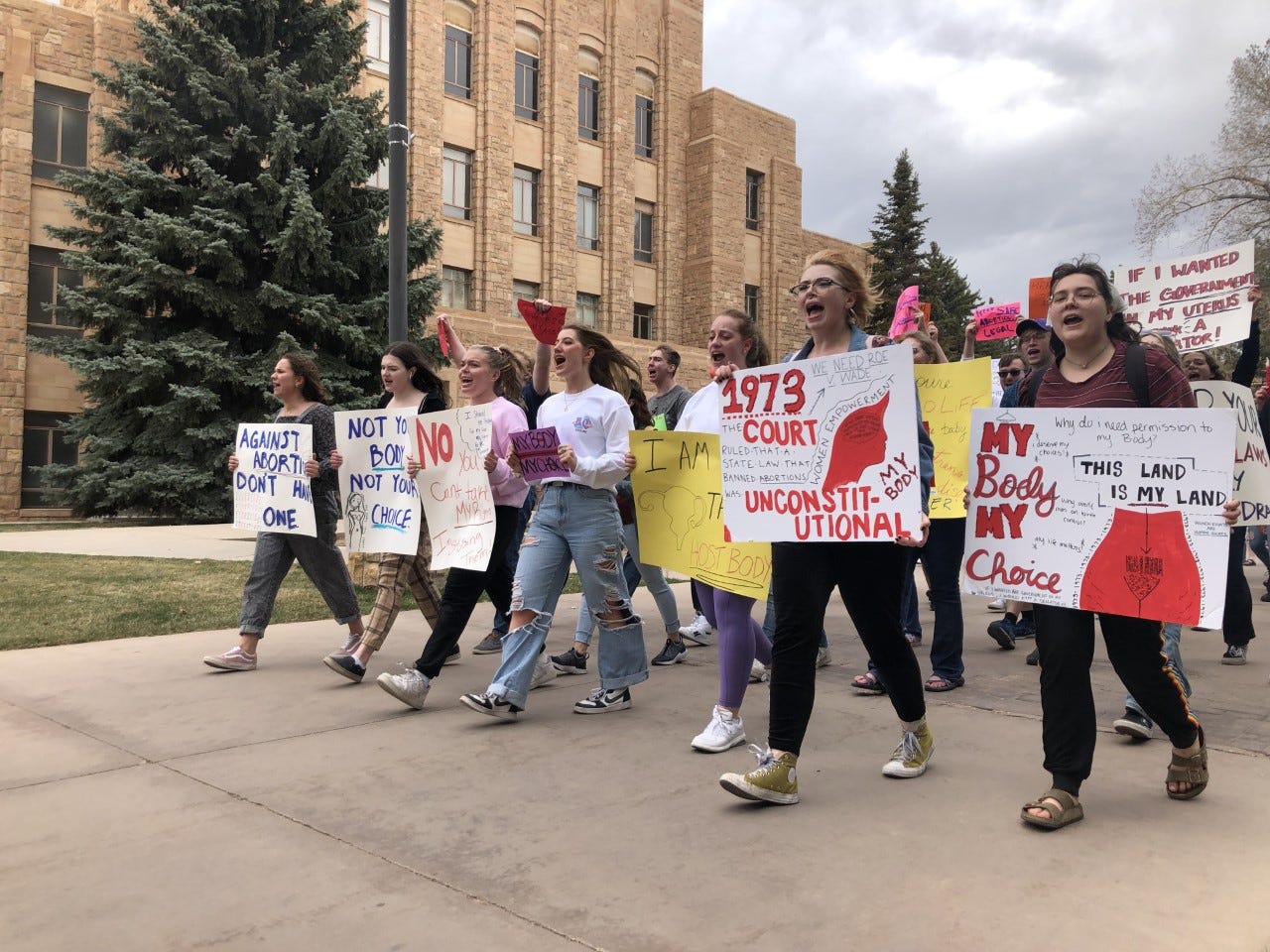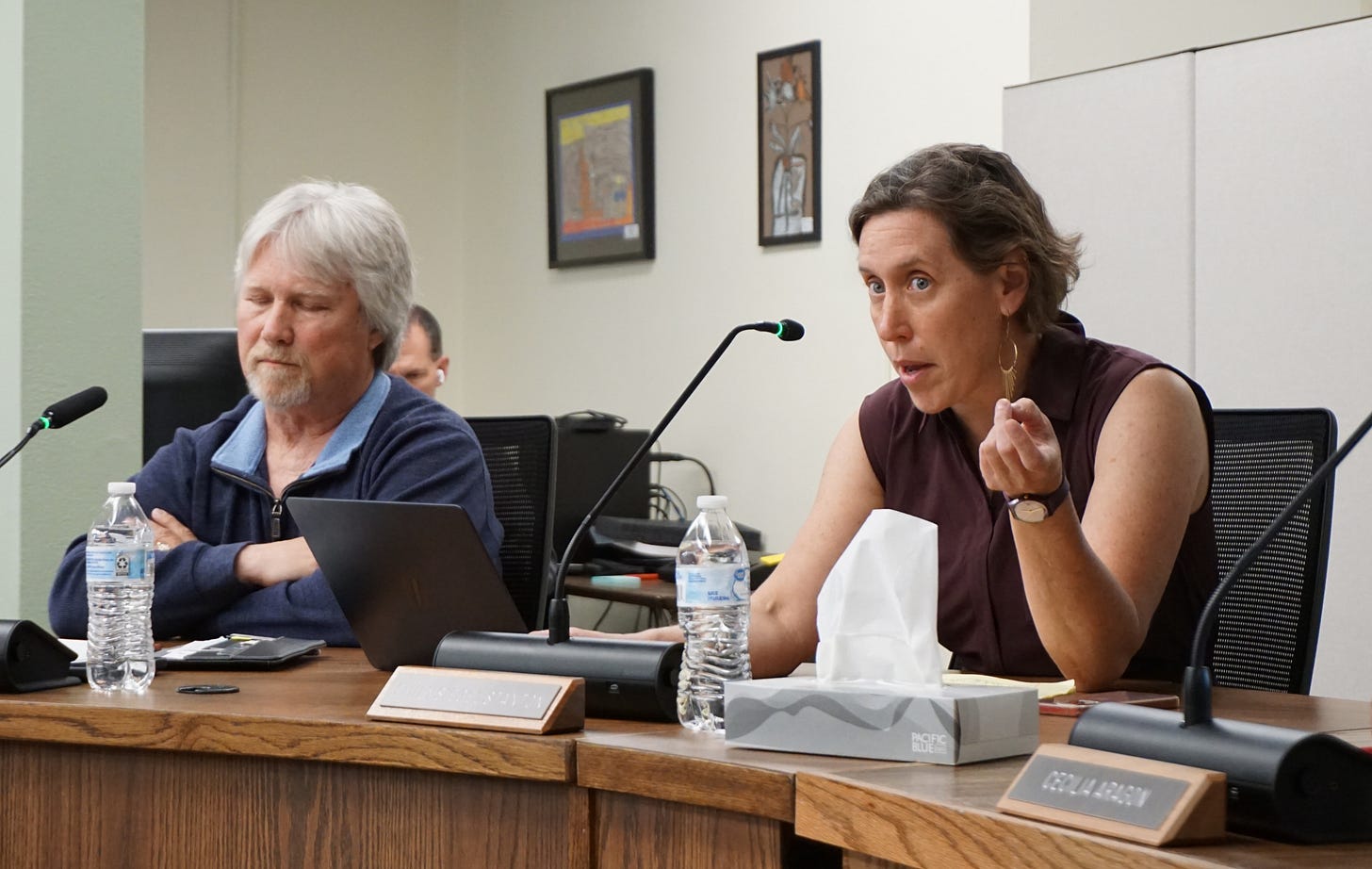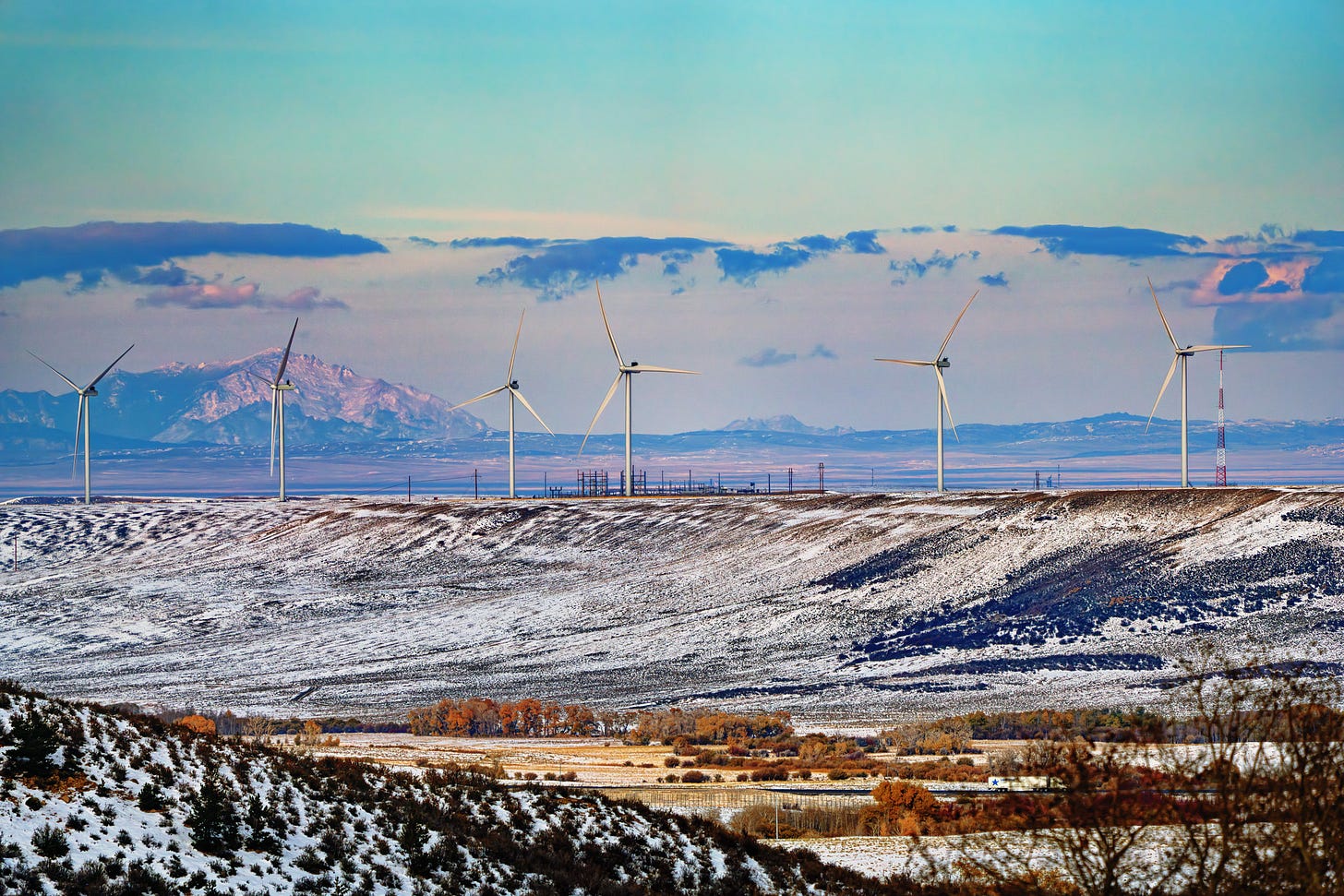Senate 10: The ultimate guide [Part 2]
What’s at stake? Republican Gary Crum and Democrat Mike Selmer disagree about energy, climate change, abortion and more.

When voters in Senate District 10 head to the polls on Nov. 5, they will decide the next four years of their district’s representation in Wyoming’s upper chamber.
On the ballot are Republican Gary Crum — who defeated a primary opponent last month — and Democrat Mike Selmer, who ran unopposed in his own primary.
Crum is a lifelong Wyomingite who founded and now runs Western States Bank. He vastly outspent his primary opponent and raised far more than Selmer during the primary fundraising season.
Crum is a moderate Republican, eschewing hardline stances on hot-button issues like abortion, but voicing support for the fossil fuel industry and for using public dollars to fund private schools, among other conservative and right-wing stances.
Selmer is an active member of the local Democratic party. He served as its chair until he stepped down this summer to focus on his bid for Senate 10. Initially “reluctant” to get in the race, Selmer filed to run just minutes before candidate filing closed.
He said he wants to give voters an alternative to what he sees as the increasingly “extreme” policies of the Republican Party. He supports abortion rights, denounces forced outting policies in schools and — while he hasn’t attacked fossil fuels — has said Wyoming needs to make itself “more resilient” in light of the challenges climate change will pose for the state.
Senate 10 has historically favored Republicans, but the vote split between Republicans and Democrats has been falling. This is, however, the first contest for Senate 10 since the redistricting that followed the 2020 U.S. Census. Today, about 55% of voters in Senate District 10 are registered as Republicans while about 40% are registered as Democrats and 5% are registered some other way.
In Albany County, many voters registered as Republicans are not ideological conservatives but are rather opportunists maintaining a strategic party affiliation with the GOP to participate in its primaries.
Part 1 of this guide introduced voters to the candidates, highlighting Crum’s primary victory and campaign fundraising as well as Selmer’s background and candidacy.
This second installment explores what’s at stake in the Senate District 10 race and analyzes the candidates’ policy positions.
Part 3 will present the Laramie Reporter’s 10-part questionnaire with answers from both Crum and Selmer.
Crum vs. Selmer
Viewed as the more moderate choice in the Republican primary, Crum now stands far to the right of his general opponent when it comes to energy policy, climate change, abortion and LGBTQ+ rights. The two also disagree about university curriculum and how much control the Wyoming Legislature should exercise over it.
The candidates generally agreed that the legislature has lost respect in the eyes of many state residents and that, whatever the issues, the state government ought to regain some level of civility.
But even a cursory glance at their policy positions reveals Crum and Selmer are running on very different platforms.
Though Crum focused more on rural healthcare during the primary, the Republican nominee said his top goal (after restoring civility) will be aiding the state economy by supporting Wyoming’s main industries — chiefly, oil and gas, but also agriculture.
“I think we’ve got to find a way to enhance our core industries, and that’s the natural resources industries — mining, natural gas, fossil fuels production — and do that in a responsible way, which I think the companies in the state of Wyoming do for the most part,” Crum said.
He added ensuring healthcare access in rural places and improving transportation safety (such as by making Highway 287 a four-lane road) are also principal concerns.

Selmer, meanwhile, framed the choice between Crum and himself as an opportunity for a referendum on the modern Republican Party.
“I think freedom is the most immediately important issue facing Wyoming today,” Selmer said. “In the legislature, we’ve seen some lawmakers trying — and often succeeding — to chip away at some freedoms we Wyomingites take for granted.”
In interviews, forum appearances and the Laramie Reporter questionnaire, Selmer pointed to recent right-wing victories in Wyoming — passing an abortion ban, outlawing gender-affirming care for minors, requiring schools to out transgender students, and eliminating the diversity office at UW — as examples of this “chipping away.”
Many of those efforts have been spearheaded or supported by the Freedom Caucus, the far-right faction of Wyoming’s Republican Party. The caucus has been gaining power in recent years and could gain a majority in the State House of Representatives if everything goes its way Nov. 5.
“A caucus that named itself ‘freedom’ pushes an extremist agenda that threatens many of the freedoms of individuals and families that don’t accept the “Freedom” Caucus’ narrow viewpoint,” Selmer said. “I will fight to retain those freedoms for everyone.”
The Freedom Caucus has not endorsed Selmer’s opponent. While the Freedom Caucus is a consortium of lawmakers in the House of Representatives, it has staunch allies in the State Senate, who fight for similar or identical goals in their own chamber, and it endorsed a few senators during the Primary Election last month.
Crum said he is not aligned with the Freedom Caucus — nor with its moderate Republican counterpart, the Wyoming Caucus.
“I’m not going to be a part of any caucus other than the Republican Caucus, working for the betterment of the State of Wyoming and Albany County,” Crum said. “I represent the folks of Albany County — Laramie, Rock River, Centennial and the other communities — and that’s really the caucus I’m a part of.”
Where they stand on the issues
The Laramie Reporter will publish a full questionnaire, with answers from both Crum and Selmer, tomorrow. Below is a breakdown of where the candidates stand on the issues that most starkly divide them.
Energy and climate change
Climate change is a top concern for Selmer, but the Democrat said Wyoming should take measured actions to counter its effects rather than drastic actions which could hurt Wyomingites.
“We don’t need to hurt energy sector workers,” he said. “We do need to be honest and begin making our state less reliant on fossil fuels.”
Selmer said Wyoming can’t do much, at this point, to avert the effects of climate change. But it can focus on resilience and preparing itself for the predicted uptick in wildfires, drought and heat.
“Even if political realities in Wyoming suddenly changed, any actions our state could take in the next four years that might have real impact would bankrupt us and cause incredible harm to Wyoming families,” Selmer said. “What the state can and must do is be honest with Wyoming citizens and begin helping our communities become resilient to the challenges ahead. Protecting our state’s water supply and supporting local and regional food production are important first steps … Climate change is here.”
Crum does not view climate change as the threat Selmer does.
“If you look back over history, I think the United States, including Wyoming, have done a great job in making energy cleaner and cleaner and cleaner,” Crum said. “However, I think we need to remember global warming started 10,000 years ago when man didn’t have a problem. We were in an ice age, and the Earth has been warming for 10,000 years.”
While climate change has always been a factor of life on earth, the rate of change brought on by human activity since the Industrial Revolution is unprecedented, and it is having unprecedented effects on the global average temperature, sea levels, ice sheet coverage and both the frequency and intensity of extreme weather events.
Like Gov. Mark Gordon, Crum said he supports an “all of the above” approach to energy — a stance that allows for the development of nuclear, wind and solar capacity while allowing for, or championing, a bright future for coal, oil and gas.
“I’m for all energy, but I’m not against any energy either,” Crum said. “So I think we need to continue to promote — as I talked earlier, our fossil fuel industry, [though] it really isn’t fossil fuels, because they’re not fossils — but our natural resources, and use them efficiently and cleanly. And our coal is the big driver. There’s enough coal here for 100 more years to power America.”
Abortion and reproductive rights
Selmer’s position on abortion is both unambiguous and in line with the dominant view of his party.
“A woman’s reproductive freedom should not be infringed, including the option of abortion,” he told the Reporter.
Crum, on the other hand, told a League of Women Voters forum this summer: “I’m pro-life, but there is a place for abortions when the mother’s life is in jeopardy.”
But the Republican candidate does not like talking about abortion. During the primary, this set Crum apart from his Republican opponent, Keith Kennedy, who took a stance as unambiguous as Selmer, but in the opposite extreme, and who prominently displayed that stance on his campaign website.
When Crum is asked about the topic, he often pivots to discussing what he views as bigger issues, frequently suggesting that the hot-button topic of abortion rights is a distraction from larger trends in healthcare access.
“Like I say, that’s an issue where people are going to tend to get stuck on and we don’t need to get stuck there,” he said. “We need to be focused on issues that we can solve and make a difference in people’s lives. We need to focus on mental health. We need to focus on emergency medical services in our community … We need to get things done for the state of Wyoming.”

At time of print, abortion is legal in Wyoming.
Lawmakers passed two abortion bans during the 2023 Legislative Session, one prohibiting nearly all surgical abortions, another prohibiting all chemical or medication abortions. But abortion providers and advocates have challenged those bans in court and halted their implementation. Final arguments in that case were heard more than half a year ago, yet state residents are still awaiting a ruling.
“I’m a pro-life guy, but I understand the state of Wyoming too,” Crum said. “And I’m going to wait for that legal decision to come out to see.”
Housing and rentals
Both candidates believe the state should encourage the development of affordable housing and both broadly support local control in the area of zoning, affordable housing, and rental safety.
“If we can’t provide housing for people to live in Wyoming, then we’re not going to grow this state,” Crum said. “So housing is really important.”
Crum said the state should invest in infrastructure. The necessary buildout of local infrastructure required by new development is often a hurdle for developers and for the eventual homeowners, to whom the costs of that buildout are passed.
Crum said helping developers clear this hurdle could help.
“As those lots would sell, the state would get paid back for their investment, right? It’s an investment. It’s not a gift,” he said. “And we need to work on regulations, from the state point of view, that we encourage development, not hinder development … We don’t need to be telling each city and county what to do.”
Selmer said he supports many of the proposals currently being discussed by state lawmakers (such as the expansion of tax increment financing), as well as affordable housing measures being adopted at the local level (such as altering zoning regulations to allow for greater housing density).
Selmer said it comes down to empowering developers.
“Like many others, I think all options should be on the table at the start of this conversation,” he said. “Tax incentives, zoning changes, and other measures that free up abandoned or outlying lots all have potential. Land is abundant in Wyoming and intelligent use of it should help relieve this problem.”
Affordable housing is just one facet of the current discourse surrounding shelter. In Laramie, the city government adopted a Rental Housing Code, outlining basic health and safety requirements for rentals within city limits.
Laramie is the first city in Wyoming to adopt such a code and in doing so, has grabbed the attention of state lawmakers. Two attempts have been made to outlaw Laramie’s code and forbid other communities across Wyoming from issuing their own. While those attempts have thus far failed, it is possible that individual lawmakers will bring a bill seeking to preempt the area of rental regulations during the next legislative session.
Selmer supports Laramie’s rental housing code and the ability of communities across Wyoming to pass their own.
“I don’t believe renters should be made to suffer because some believe unsafe and substandard housing is better than none at all,” Selmer said. “Of course, landlords who like to say ‘shut-up or leave’ to their tenants oppose the right of Wyoming communities to regulate their bad behavior.”
When the Reporter asked Crum about the city’s rental housing code, the candidate spoke broadly about regulations that are not part of Laramie’s code.
“I don’t believe in price caps, salary caps, rental caps, and that never works,” Crum said. “The way we can help with that is promot[ing] what we just talked about. It’s a supply and demand issue. If you have enough quality housing, that landlord will have to fix that property if he wants to rent, if he chooses not to fix it, it won’t rent. But the issue is providing more quality housing for people to live in, not putting caps or regulations on people.”
There’s a broad consensus among economists that rent control is not good for a community’s rental housing stock.
“Rent controls appear to be quite effective in terms of slowing the growth of rents paid for dwellings subject to control,” notes the abstract of a meta-analysis published this year. “However, this policy also leads to a wide range of adverse effects affecting the whole society.”
But Laramie’s City Rental Housing Code does not include or address rent control and the discussions leading up to the code’s passage did not touch on that topic.
Informed about the provisions of Laramie’s rental code, Crum said he supported some while denouncing others. Though it’s been a source of disagreement, even between landlords, Crum said rentals should be required to have carbon monoxide detectors.
“The house needs to be safe … carbon monoxide detectors make sense, and they cost a few dollars to put in,” he said.
But Crum was less impressed by other provisions of the code, such as those requiring that major electrical, plumbing or heating work be completed by licensed professionals.
“If the owner of a building has the ability to do it themselves, they ought to have the ability to do it themselves,” he said. “They shouldn’t have to go hire somebody to do it for them.”
City of Laramie officials have defended the rental code before lawmakers, as have some landlords.
LGBTQ+ rights
In the last two years, Wyoming has passed three laws restricting the rights, privileges and privacy of queer state residents, especially transgender youth.
In 2023, Wyoming passed a sports ban, forbidding transgender women and girls from competing on sports teams consistent with their gender identity.
In 2024, the state passed one bill outlawing gender-affirming care for transgender youth and one bill requiring schools to report any changes in a student’s “well-being” to their parents — a provision interpreted by both supporters and opponents as requiring schools to out transgender students to their families, among other mandatory reporting.
Crum said he supports this last bill in the name of parental rights.
“I support families and I support parents,” he said. “And parents have a right to know what their children are doing — whether it’s in school, whether it’s the doctor, or whether it’s this issue, whether it’s what they’re doing at 6:30 at night — a parent has the right to know what their child is doing. Period.”
Crum said there are sufficient safeguards in place to keep children safe even when schools and school counselors are forced to out a gay or transgender child.
“If there’s something illegal going on with the parent — a parent’s abusive or beating the child — then there’s laws in place already to take care of that,” Crum said.
But that is not the majority opinion of school advocates, nor of the Albany County School Board. As the board discussed the issue, Trustee Emily Siegel-Stanton, among others, argued there is nothing in the law or the new policy to protect a student from being kicked out or being punished in other ways falling short of legal abuse. To make use of the “abuse” exemption to the forced outting policy, school officials must be prepared to take the extraordinary step of reporting suspected abuse to the state Department of Family Services.

School board trustees also pointed to other issues raised by the new mandatory reporting, such as the way it appears to conflict with school counselors’ professional code of ethics and the likelihood that students will stop seeking help at school, knowing that what they say to a trusted adult outside the home will be repeated to their parents.
Crum is not swayed by these arguments.
“For a parent to be denied what is happening with their child, I’m totally against that,” he said. “That’s how I’ll vote … The parent has a right to know. It doesn’t matter what the issue is.”
Crum would not say whether he supports the ban on gender-affirming care for transgender youth.
“I can’t speak to that,” he said. “That’s a medical issue, and I need to learn more.”
The ban prohibits doctors or other medical professionals from proffering a wide range of gender-affirming care to those under 18, including hormone blockers, hormone therapy and surgery.
While surgery is almost never considered best practice medicine for transgender people under 18, hormone blockers and hormone therapy are. Those treatments enjoy consensus support from the relevant experts and such care has been shown to increase quality of life for those who receive it while reducing depression and suicidality.
The ban in Wyoming makes specific exemptions for young cisgender patients seeking the same care — from hormone blockers to mastectomies — for medical reasons unrelated to gender transition.
Selmer was more willing to talk about his stance on gender-affirming care than Crum, and — as with abortion — the Democrat offered an unambiguous statement in line with the majority of his party.
“I consider myself an ally of the LGBTQ+ community and will defend their rights,” he said.
The two anti-LGBTQ+ bills passed by Wyoming Republicans in 2024, Selmer said, demonstrate a fundamental hypocrisy in the way the GOP approaches LGBTQ+ issues.
“It’s amazing that, on the one hand, the legislature would demand the right of parents to be informed of any confidential conversation a student might have with a mental health professional — while on the other hand denying those parents the right to make healthcare decisions for that student that might protect their mental health and prevent suicide,” Selmer said. “In my opinion, taken together, these bills show an intent to harm the LGBTQ+ community, which is part of every Wyoming community.”




Did I read somewhere that Crum stated (essentially) that one is a better person if they are a Christian?
Crum sounds as if he’d feel at home in Salem, MA circa 1692.